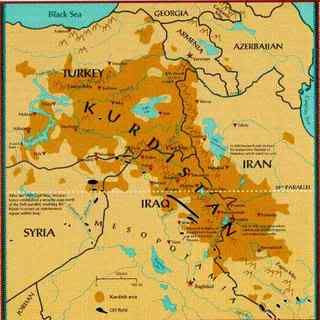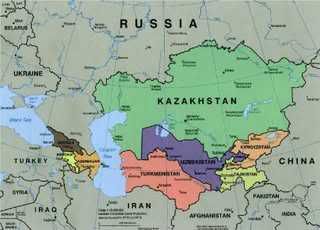
The Asia Times:
Again, it is the oil and gas supplies from Iraq that will help realize the viability of the 3,300-kilometer Nabucco pipeline (running from the Caspian Sea via Turkey and the Balkan states to Austria), without which Russia's tightening grip over the European energy market cannot be loosened, which, in turn, holds profound implications for Russia's relations with Europe and for the US's trans-Atlantic leadership.Here is the International Herald Tribune:
US policy review on Turkey
Thus, all in all, Washington has estimated the urgent need to accommodate Turkey's aspirations as a regional power. The Bush administration seems to have undertaken a major policy review toward Turkey in the October-November period last year around the same time it considered the follow-up on the troop "surge" in Iraq. It concluded that for a variety of reasons, abandoning Iraqi Kurds to their fate is a small price to pay for reviving Turkey's friendship.
The turning point came during the visit of Erdogan to the US in November. Almost overnight, the body language of US-Turkey relations began to change. The chilly rhetoric abruptly changed to warm backslapping. The emphasis was on the commonality of interests in the struggle against terrorism. There was an unmistakable impatience in the US calls on the Iraqi Kurdish leadership to restrain the PKK through concrete steps.
Immediately after Erdogan's visit, deputy chief of the Turkish General Staff, General Ergin Saygun, received his American counterpart, General James Cartwright, and the US's top commander in Iraq, General David Petraeus, in Ankara for follow-up discussions. They established a mechanism for intelligence-sharing. And the US began supplying Turkey with real-time intelligence regarding PKK activities in northern Iraq.
By the time US Secretary of State Condoleezza Rice arrived in Ankara a week later in early December, she could already acknowledge that Turkey had a "comprehensive plan" to fight the PKK. The tacit understanding with the US enabled Turkey to launch the air strikes inside northern Iraq from December 16 onward. Washington - and European countries - openly accepted the legitimacy of Turkey's attacks on the PKK bases. It was a major diplomatic and military victory for Ankara.
[snip] (my bold)
Even the left-wing Kemalist Cumhuriyet newspaper acknowledged, "A new era is upon us [in US-Turkey relations]." With a sense of deja vu, Iraqi Kurd leaders began realizing that Bush has done a Kissingerian trick on them and the ground has shifted beneath their feet. Since November, they have been resigned to the inevitability of Turkish military operations inside northern Iraq. More important, they have assessed that with the u-turn in US policy, the odds are heavily stacked against them. The Kurds know from long experience it is futile to be defiant of a superpower, especially when it bonds with a strong regional power - at least for the time being.
Both Barzani and Kurdish leader and President Jalal Talabani have accepted that as long as the Turkish operations are in the nature of "limited military incursions to remote, isolated, uninhabited regions" of northern Iraq - to quote Iraqi Foreign Minister Hoshyar Zebary, who is also Barzani's nephew - they won't make a fuss about the Turkish violation of Iraqi sovereignty. When the Turkish jets and helicopter gunships first appeared over the northern Iraqi skies in mid-December, it was apparent that Barzani had abandoned the PKK and henceforth the latter would be on its own. Barzani expects Ankara to appreciate his attitude as a serious concession and an act of goodwill.
[snip]
Certainly, when someone takes its help, Washington usually expects the friend to return the favor. Ankara can't be an exception. But, will the AKP reciprocate? It will be a tough call. The Islamist AKP government will seriously ponder over the irony of ordering troops to get cracking on militant Islamists as part of a NATO force, which a growing number of alienated Pashtuns in Afghanistan and Pakistan view as an occupation army. Turkey would consult its close friend, Pakistan.
But Bush is running out of time. He will expect Erdogan and Gul to stand up and be counted as true friends by the time NATO gathers for its summit in Romania in early April. Hyland sums up, "Given the stakes for the United States, the tough negotiations over the NATO/ISAF mission in Afghanistan have just begun with other NATO allies as well as with Turkey. After making a general appeal for additional troops across the entire NATO community, the United States appears to have chosen Turkey as the 'best-chance' ally to focus on for immediate results.
"Turkey's success against the PKK since real-time intelligence made it possible to hit targets in Iraq with pinpoint precision, is a considerable inducement in the ongoing discussions, especially as spring approaches - the traditional season for the commencement of another PKK campaign."
And from another article in The Hindu:Turkey has assured Iraq and the U.S. military that the operation will be limited to attacks on rebels. Both the United States and the European Union consider the PKK a terrorist group.
The Iraqi government has criticized the offensive.
"We know the threats that Turkey is facing, but military operations will not solve the PKK problem," Ali al-Dabbagh, an Iraqi government spokesman, said Saturday.
The rebels, meanwhile, warn that they have the advantage of fighting on their home terrain.
"We are using guerrilla fighting techniques and not fighting as one fixed front," said Havaw Ruaj, a PKK spokesman. The rebels are skilled at fighting in the rocky mountainous area and changing their positions, he added.
Massoud Barzani, head of the regional administration in the semiautonomous Kurdish area, warned that Turkey would face large-scale resistance if it targeted civilians in its incursion.
Kurdish demands have run the spectrum from self-rule to more-limited rights, like increased freedom to educate and broadcast in their language.
The Turkish government granted some cultural rights to Kurds as part of its bid to join the European Union. But many Kurds, who make up 20 percent of Turkey's population of 75 million, chafe under state controls on freedom of expression.
Lars Akerhaug of The Monthly Review Magazine suggests this ploy:No wonder, Mr. Erdogan hit out at Washington’s sophistry in his recent interview with Sunday Times: “We have told President Bush numerous times how sensitive we are about this issue [PKK] but up till now we have not had a single positive result. America is our strategic partner. But in northern Iraq, we feel that both the terrorist organisation and the administration there are sheltering behind America… It makes us sad to see American weapons being found in the possession of the terrorist organisation acting against Turkey.”
In principle, Washington counsels a “political solution” to Turkey’s Kurdish problem. In essence, it is nudging Turkey to negotiate directly with the KRG. Meanwhile, Turkey feels the pain of PKK terrorism. As Opposition leader Deniz Baykal put it, “The knife has reached the bone.”
Ankara is on a painful learning curve. It has no choice but to knock on Washington’s door. The alternative is to invade Iraq, which could get it into a quagmire with frightful consequences. Yet, Turkey is one of America’s oldest transatlantic partners — a founder of the NATO, in fact. It remains crucial for the U.S. strategic interests in the Middle East and the Black Sea regions.
Washington is bargaining with Turkey. Why so? The fact remains that Turkey’s regional policies have changed course under the Justice and Development Party (AKP) government. Ankara has become noticeably circumspect in the recent years toward the U.S. regional policies. Apart from the Islamist roots of the AKP government, other factors have come into play. Turkey’s refusal to join the invasion of Iraq in 2003; the AKP government’s dealings with the Hamas leadership in Palestine; independent stance on Lebanon; warming of ties between Turkey and Iran and Syria; Ankara’s calibrated distancing from the U.S. strategy in Iraq; strengthening of Russia-Iran cooperation; growing flexibility in Turkey’s relations with the West; and a newfound proximity between Turkey and the East — all these have added up as complicating factors in the U.S-Turkey relations in the past four years.
In sum, Ankara is being made to realise that it simply cannot afford to have an independent foreign policy in its surrounding regions. The bottom line, as far as Washington is concerned, is Turkey forms part of the Western security system and the bondage is like a Catholic marriage — in perpetuity. As the new cold war gathers momentum, there is added urgency for Washington that Turkey should not remain a bystander, as in the Iraq invasion of 2003, if a U.S. military strike against Iran ensues.
The standoff in the inhospitable mountains of the Turkish-Iraqi border region becomes a morality play, a spectacle of the quintessence of “strategic partnerships” in contemporary world. Not too long ago, strategic thinkers in their ivory towers would have thought that the U.S. regional policy provided for Turkey a special status as a “balancer” in the Middle East.
And it looks as if the PKK is consciously trying to get Turkey involved in Iraq. Maybe they want to weaken the relations between Turkey and the US (they're bad enough already) and thus indirectly strengthen their own relations to Washington. Maybe the guerrillas are betting that the neocons once again will attempt to exploit the Kurds, this time in a crusade against Iran?
The situation in Turkey, Iraq, and Kurdistan is a bright example of how geopolitics is centered around the United States. Since the Iraq war, Turks and Kurds have fought over support from the White House. Anyone could have predicted the current conflict. At the same time the US never had many options. They don't exactly have plenty of friends in this part of the world. This war could easily become the last step towards the collapse of the US occupation of Iraq.

So... we need Turkey to be our friend again and definitely not Russia's and we will ignore their troubles with Kurdistan and Armenia so we can run a pipeline to India while preventing China and Russia from taking over areas of Kazakhstan and other oil rich countries surrounding the Caspian Sea while we plan to attack Iran where we will need the Kurds to help because Israel wants Iran's nuclear program to be stopped while we fight an unending civil war in Iraq while paying Sunnis to stop fighting Shiites and take time to fight al-Qaeda who are rebuilding in Afghanistan and we are now sending military advisors to help fight the insurgents in Pakistan and keep Musharraf from falling off his throne.
Did I miss anybody?
crossposted at SteveAudio